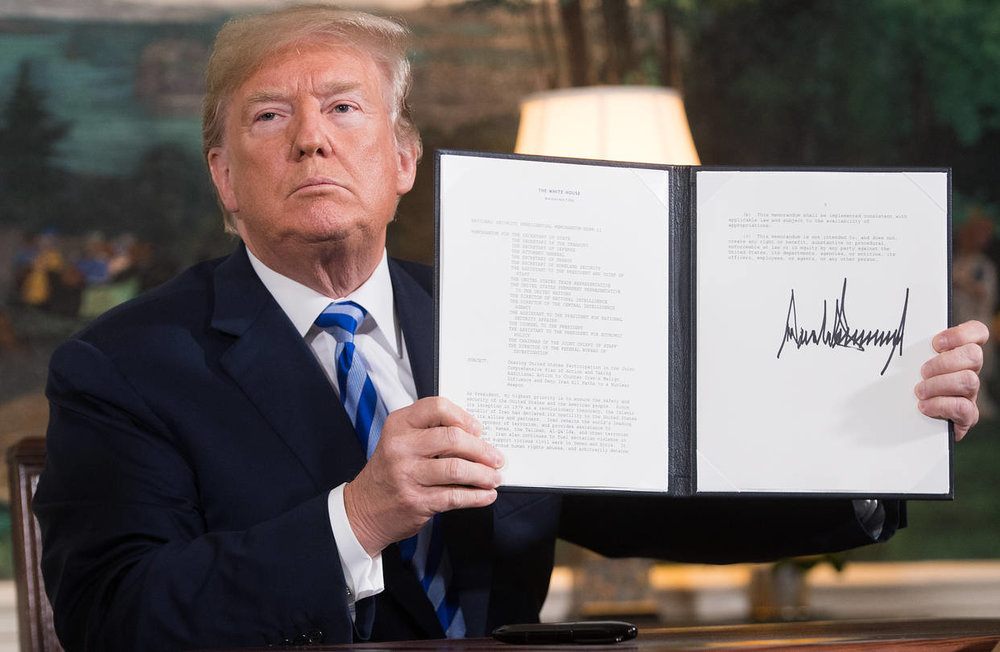Trump's dangerous lies on Iran

Martin Luther King Jr. once said there is nothing in the world more dangerous than sincere ignorance. Well, sincere ignorance had a banner day last week when Trump unilaterally withdrew from the Iran nuclear deal.
A CNN/ORC poll taken shortly before Trump’s decision found that a majority of Americans — 63 percent — wanted the U.S. to stay in the deal. But get this: 62 percent of Americans believed Iran had violated its terms.
To me, the second result is the more alarming.
That poll is proof of sincere ignorance of the deal on the part of nearly two-thirds of Americans. They are under the spell of Trump’s distortions.
The president’s partisan attacks on the Democrats who negotiated the deal — President Obama and former Secretary of State John Kerry — have left people with the sense that this is nothing more than one more political fight among many.
Trump has turned national security into just another political act in the Trump reality show.
No matter how provably false Trump’s claims about the Iran deal, he has succeeded in producing a fog of public confusion and uncertainty about the truth — more of that sincere ignorance.
For the record, Iran never violated the Joint Comprehensive Plan of Action (JCPOA). And there is no evidence the deal is “defective at its core,” as Trump likes to say.
Trump’s own State Department has repeatedly certified — as recently as last month — that Iran was living up to its end of the deal. In April, Defense Secretary James Mattis described the pact’s verification provisions as “pretty robust.”
And the International Atomic Energy Agency (IAEA) has issued quarterly reports certifying that Iran is in compliance.
But the truth has not stopped Trump.
He keeps calling the deal “disastrous” and “a great embarrassment,” and telling Americans that it allowed Iran to eventually “reach the brink of a nuclear breakout.”
The Washington Post’s Fact Checker gave Trump a four Pinocchio rating — a “whopper” of a lie — for the claim that the deal frees Iran in seven years to “create nuclear weapons.”
But just as the facts are not in question, neither is the power of Trump’s false sales pitch. It is the only way to explain why 62 percent of Americans believe Iran violated the deal.
Trump’s success in twisting public thinking with brassy indifference to the truth on Iran and nuclear weapons fits with the distortions he used last year when he pulled the U.S. out of the Trans-Pacific Partnership (TPP) and the Paris climate accords.
For TPP, the lie was that the deal was harmful to American workers. In reality, American businesses and American workers lost out on opportunities in emerging Asian countries.
For the climate deal, the lie was that it would cost American jobs and raise American energy prices. In reality, the U.S. lost out yet again on the burgeoning green energy sector and all the jobs and clean, cheap energy it would have created.
But while TPP and Paris were missed economic opportunities, the decision to end the Iran deal endangers the national security of the United States and opens a box of evil spirits in the Middle East. Already, Israel and Iran are trading fire in Syria, opening the way for a new round of potentially deadlier warfare.
Here is a Democrat, Sen. Bob Menendez (D-N.J.), a longstanding opponent of the original deal, pointing out that with the U.S. out of the deal, Iran is closer to having nuclear weapons:
"With this decision President Trump is risking U.S. national security, recklessly upending foundational partnerships with key U.S. allies in Europe and gambling with Israel’s security. Today’s withdrawal from the [Joint Comprehensive Plan of Action] makes it more likely Iran will restart its nuclear weapons program in the future."
When he was running for president, Trump made a similar point.
Trump told NBC News in August 2015 that if he were president, he “would police that contract so tough that [Iran would not] have a chance [to cheat.] As bad as the contract is, I will be so tough on that contract.”
Now there is no deal to enforce and no chance to be “tough.” And it isolates the U.S. from its global partners.
French President Emmanuel Macron, probably the European leader closest to Trump, also called the decision a “mistake.”
And Arizona Republican Sen. Jeff Flake pointed out the obvious when he said withdrawing from the Iran deal now makes no sense because “Iran has already realized the benefits of sanctions relief and the release of frozen assets.” Flake added that since Iran is free of international oversight, Tehran is “off the hook when it comes to honoring their nuclear obligations under the agreement."
Flake is right. Even so, there are Middle Eastern leaders who want war. The New York Times Editorial Board declared last week that war in the Middle East does not matter to “anti-Iran hard-liners in [the Trump] administration, Prime Minister Benjamin Netanyahu of Israel and Saudi Arabia, who all seem to believe their problems with Iran can best be solved by driving out the regime through economic crisis or military action.”
A cynic might look at this and conclude that those same hardliners pushed Trump to end the deal without cause in order to move the US closer towards a military confrontation with Iran.
National Security Advisor John Bolton, we’re looking at you.
(Source: The Hill)
Leave a Comment